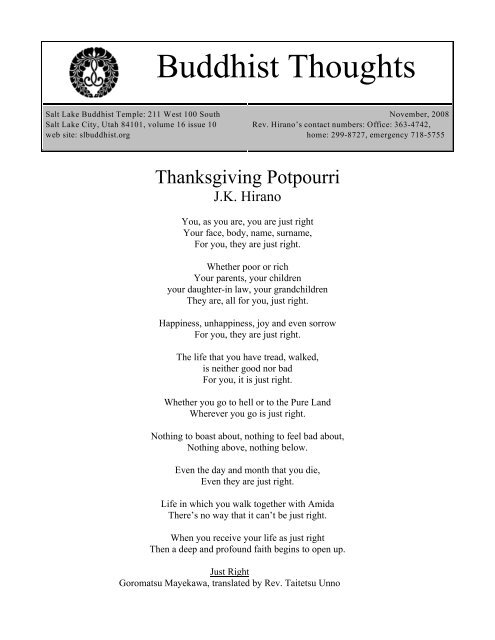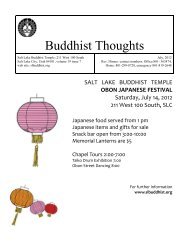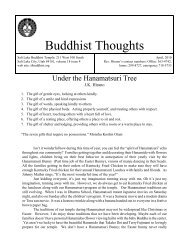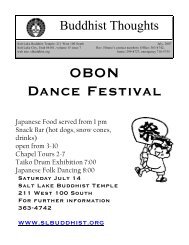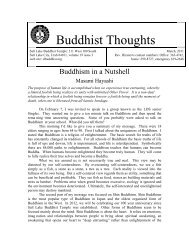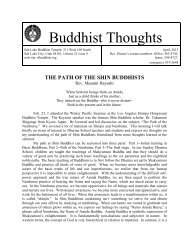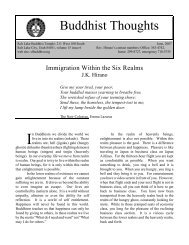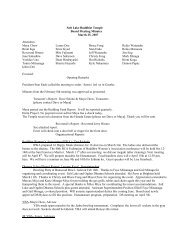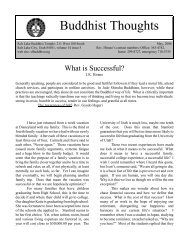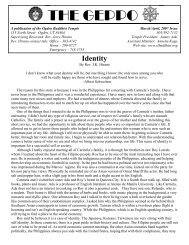Buddhist Thoughts - Salt Lake Buddhist Temple
Buddhist Thoughts - Salt Lake Buddhist Temple
Buddhist Thoughts - Salt Lake Buddhist Temple
You also want an ePaper? Increase the reach of your titles
YUMPU automatically turns print PDFs into web optimized ePapers that Google loves.
<strong>Buddhist</strong> <strong>Thoughts</strong><br />
<strong>Salt</strong> <strong>Lake</strong> <strong>Buddhist</strong> <strong>Temple</strong>: 211 West 100 South<br />
<strong>Salt</strong> <strong>Lake</strong> City, Utah 84101, volume 16 issue 10<br />
web site: slbuddhist.org<br />
November, 2008<br />
Rev. Hirano’s contact numbers: Office: 363-4742,<br />
home: 299-8727, emergency 718-5755<br />
Thanksgiving Potpourri<br />
J.K. Hirano<br />
You, as you are, you are just right<br />
Your face, body, name, surname,<br />
For you, they are just right.<br />
Whether poor or rich<br />
Your parents, your children<br />
your daughter-in law, your grandchildren<br />
They are, all for you, just right.<br />
Happiness, unhappiness, joy and even sorrow<br />
For you, they are just right.<br />
The life that you have tread, walked,<br />
is neither good nor bad<br />
For you, it is just right.<br />
Whether you go to hell or to the Pure Land<br />
Wherever you go is just right.<br />
Nothing to boast about, nothing to feel bad about,<br />
Nothing above, nothing below.<br />
Even the day and month that you die,<br />
Even they are just right.<br />
Life in which you walk together with Amida<br />
There’s no way that it can’t be just right.<br />
When you receive your life as just right<br />
Then a deep and profound faith begins to open up.<br />
Just Right<br />
Goromatsu Mayekawa, translated by Rev. Taitetsu Unno
2 <strong>Salt</strong> <strong>Lake</strong> <strong>Buddhist</strong> <strong>Temple</strong>: 211 West 100 South<strong>Salt</strong> <strong>Lake</strong> City, Utah 84101, volume 16<br />
issue 6web site: slbuddhist.org June, 2008<br />
This poem translated by<br />
Rev. Taitetsu Unno is a<br />
favorite poem of mine.<br />
It’s interesting how time quickly passes,<br />
I used it the other day in a Dharma Talk<br />
and a number of people came up to me<br />
and told me how much they liked that<br />
poem. I used to use it a lot in the past,<br />
but I didn’t want to overuse it and here it<br />
is that people are hearing it again, as if<br />
for the first time. I don’t know anything<br />
about the author of the poem, other than<br />
his name and that he was a devoted lay<br />
Shin <strong>Buddhist</strong>. And a number of people<br />
wanted copies so I thought I would use<br />
it to begin my article.<br />
My latest obsession is jazz. I<br />
haven’t really listened to jazz since I was<br />
in High School and the first few years of<br />
college. One of my favorite musicians is<br />
a trumpet player by the name of Chet<br />
Baker. I could listen to him for hours.<br />
He made beautiful music, but had a very<br />
difficult life. He died at the age of 58.<br />
Many people believe he died from his<br />
drug addiction. He fell out of a hotel<br />
window and was found in the street.<br />
Heroin was found in his body and hotel<br />
room. Other favorite and famous<br />
musicians such as Charlie Parker, John<br />
Coltrane and Miles Davis, also suffered<br />
from serious drug addictions. It’s<br />
somewhat ironic that a number of my<br />
favorite muscians and authors have<br />
commited suicide. My favorite Japanese<br />
author is Yasunari Kawabata, Nobel<br />
prize winner. One of my favorite<br />
American authors is Ernest Hemingway.<br />
Both of these men died by their own<br />
hand.<br />
The other day Ruth Kawashima<br />
lent me a cd to listen to called<br />
“Paramita”. In parenthesis it said,<br />
“American <strong>Buddhist</strong> folk music.” She<br />
said it was one of the funniest cds she<br />
had ever heard. It wasn’t mean’t to be a<br />
funny cd, but after listening to it, I had to<br />
agree. I could only listen to it for a short<br />
time, switching from song to song. It<br />
was folk music with guitars and fiddle as<br />
the instruments. The instrumentals<br />
weren’t bad, but some of the lyrics to the<br />
music was terrible. There was a song<br />
called “Yashodara” about Shakyamuni<br />
Buddha’s wife and how he left her.<br />
Another one called “American Beef<br />
Cow”, was about vegetarianism. The<br />
inside flap of the cd cover was a picture<br />
of musicians in their monk’s robes. It<br />
was as if the music were a hammer<br />
trying to pound <strong>Buddhist</strong> concepts into<br />
my head. Kind of like Big Bird on<br />
Sesame Street teaching the ABCs. I get<br />
the concept, but I wouldn’t listen for the<br />
musicality.<br />
In many ways Buddhism has<br />
become a marketing tool. I see<br />
advertisements or the cover page for<br />
books, where the author puts “<strong>Buddhist</strong><br />
monk”, as a qualifier or endorsement of<br />
sorts. Monks become monks as a way to<br />
leave the everyday world of the<br />
householder and they shave their heads<br />
as a sign of humility. In many instances<br />
in the west, it seems as though shaving<br />
one’s head and donning robes is a status
3 <strong>Salt</strong> <strong>Lake</strong> <strong>Buddhist</strong> <strong>Temple</strong>: 211 West 100 South<strong>Salt</strong> <strong>Lake</strong> City, Utah 84101, volume 16<br />
issue 6web site: slbuddhist.org June, 2008<br />
symbol. You don’t become a monk to<br />
boost your status as a human being.<br />
This week I have been asked to<br />
speak at the Alberta <strong>Buddhist</strong><br />
Conference in Calgary. The theme is<br />
“Everyday Buddhism.” I believe that<br />
Buddhism can only be found in our<br />
everyday experiences. The study of<br />
Buddhism is a whole different thing than<br />
being a <strong>Buddhist</strong>. Buddhism is about<br />
living our lives in a authentic way.<br />
Moving away from the pretenses and<br />
ego accouterments.<br />
As I listen to Chet Baker’s<br />
version of “Tenderly” or “Autumn in<br />
New York” I can feel his humanity and<br />
emotions. I can share what he is feeling.<br />
The same with other great musicians,<br />
you can feel what they are feeling<br />
through their music. It can help you<br />
better understand who and what you are.<br />
It doesn’t have to be labeled,”<strong>Buddhist</strong><br />
Music”. Listening to these musicians is<br />
part of my everyday Buddhism. It is<br />
important that each of us know ourselves<br />
better, to understand who and what we<br />
are as human beings. Listening to this<br />
jazz does this for me. Listening to a<br />
music labeling itself <strong>Buddhist</strong> music,<br />
does not necessarily make it <strong>Buddhist</strong>.<br />
This month we celebrate<br />
Thanksgiving. Although it is a very<br />
American Holiday initiated by<br />
Christians, it is a good opportunity for<br />
we Jodo Shinshu <strong>Buddhist</strong>s. What could<br />
be more Jodo Shinshu of a name than<br />
Thanksgiving. Which brings me to the<br />
main focus of this article. Thanksgiving<br />
at my house is one of my favorite<br />
holidays. As I have mentioned in the<br />
past, we even celebrated Thanksgiving<br />
in Japan when I was a student there. I<br />
love the mixture of foods our family has<br />
at Thanksgiving dinner. We always<br />
have the traditional Turkey, but I put<br />
tamales in the stuffing. Along with<br />
mashed potatoes, we have white rice,<br />
gravy and shoyu. Last year we had<br />
empanadas added to the mix. We<br />
usually also have a couple of kinds of<br />
sushi. Carmela has added Filipino<br />
dishes, such as adobo or deep fried and<br />
sugared bananas. It is American,<br />
Mexican, Japanese, Filipino and<br />
whatever else can be thrown in. That is<br />
why I love this holiday and so deeply<br />
grateful for the family and friends I<br />
share it with.<br />
If you are still reading this<br />
article, by now you are probably<br />
wondering, “What the hell is Sensei<br />
rambling on about!” Well here it is, the<br />
poem, “Just Right”, Jazz, Chet Baker,<br />
John Cotrane, drug addiction, suicide,<br />
buddhist folk music, vegetarianism, beef<br />
cows, monks, their bald heads and<br />
robes,Yasunari Kawabata, Ernest<br />
Hemingway, turkey stuffing with<br />
tamales and adobo. This potpourri of<br />
ideas running through my head, is much<br />
like my favorite Thanksgiving dinner, it<br />
is all about gratitude and finding<br />
Buddhism in our everday lives.<br />
The musicians like Chet Baker<br />
and authors like Ernest Hemingway,<br />
were able to touch into the deepest<br />
realities of our human existence. At<br />
times, this life can be difficult, life is not
4 <strong>Salt</strong> <strong>Lake</strong> <strong>Buddhist</strong> <strong>Temple</strong>: 211 West 100 South<strong>Salt</strong> <strong>Lake</strong> City, Utah 84101, volume 16<br />
issue 6web site: slbuddhist.org June, 2008<br />
always happy. Yet, it always has deep<br />
meaning when we can see it with the<br />
proper perspective. These artists were<br />
able to touch into their humanity without<br />
being able to find this perspective. This<br />
perspective is the last line of the poem.<br />
“When you receive your life as just<br />
right, then a deep and profound faith<br />
begins to open up.” When we realize the<br />
infinite causes and conditions that have<br />
all worked for the benefit of our<br />
existence, it is neither good or bad, it<br />
just is. Our response can only be to truly<br />
live a life of deep humility and gratitude.<br />
Cheers! Happy Thanksgiving, Namo<br />
Amida Butsu, Itadakimasu.


